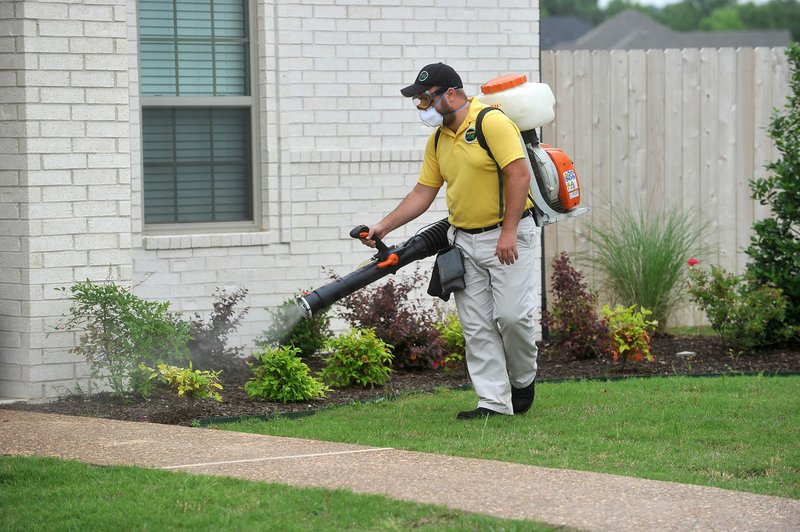FAYETTEVILLE — The mosquitoes known to carry the Zika virus call most of Arkansas home, so the state Health Department and other organizations are trying to stop it from getting a foothold here.
Five people in Arkansas have tested positive for the virus, which most often causes mild symptoms, if any, but has also been linked to serious birth defects and other problems throughout Brazil and about four dozen other largely tropical countries. All five caught the virus after traveling outside the continental United States, according to the Arkansas Department of Health.
A simple series of events could make the virus a more domestic concern: If either of two species of mosquito in the state bites an infected person, then bites and infects someone who isn’t carrying the virus and so on, suddenly the virus has moved in.
“It is possible,” Health Department spokesman Meg Mirivel said. “That’s why we’re recommending that anyone who travels to these areas should avoid mosquitoes for 21 days after they return.”
The department hasn’t released where the five people with the virus were found, their symptoms or other identifying information because there have been so few cases, Mirivel said. The cases were likely mild, she said, noting that just one in five people who catch the virus show any symptoms. Most of those who do experience fever, rashes, joint pain and reddened eyes, according to the federal Centers for Disease Control and Prevention.
Mosquitoes travel a couple hundred feet in their lifetimes, so an uninterrupted spread from the tropics seems unlikely, Mirivel said. That’s why the Health Department’s efforts start with advising returning travelers who might give the virus a shortcut to avoid mosquitoes as much as possible.
That means staying inside or wearing long sleeves, pants and effective mosquito repellent outdoors, along with emptying even small amounts of standing water around the home that mosquitoes can reproduce in, Mirivel said. Zika can be sexually transmitted by men who have it, so men coming from affected areas should avoid sex or use a condom, according to the CDC.
Some residents are taking more proactive steps. Brad Simon, a franchisee in Paris for the Mosquito Joe pest control business, said calls setting up appointments for yard spraying and other services from Little Rock to Bella Vista started pouring in by January, two or three months earlier than usual.
It’s all because of Zika in the news, he said.
“It’s not a panic type thing — it’s more of an extra precaution right now,” he said, adding that while the service can drastically reduce mosquito numbers for a few weeks, there’s no guarantee of avoiding Zika. “We get calls almost daily on it.”
The international community isn’t far away in Northwest Arkansas. The regional airport in Highfill connects to international hubs across the country, and Wal-Mart Stores Inc. expects thousands of visitors for its shareholders meeting this week, including many international travelers. The company didn’t return repeated requests for comment on how many are expected to come from affected countries and whether the company is spreading information on Zika.
At the University of Arkansas, more than 400 international students are from the affected countries, and about 140 others are studying abroad this summer in regions where the virus is present, according to university data.
The Pat Walker Health Center on campus gives detailed travel consultations for study abroad, which already included information and sometimes medical prevention for malaria and other dangerous mosquito-borne illnesses. Zika has just been folded into the process, along with pamphlets on the virus and campus information sessions, spokesman Zac Brown said.
“The immunization and travel clinic does a really great job,” he said, adding international students also get information from the center. “Our position is to make sure our students in the university programs feel supported.”
Esteban Miranda, a sophomore who last year was president of the university’s Panamanian Student Organization, said he and the other 150 or so Panamanian students weren’t overly worried about the virus, though they knew their families back home are paying attention to the risk.
“People start worrying when they see like more than 100 cases,” said Miranda, who’s staying in Arkansas for the summer. “It’s something that we actually don’t think will happen to us.”
Beyond basic information, the state Health Department is putting out mosquito traps across the state to get more detailed data on where the mosquitoes are and in what kind of numbers. Many existing mosquito maps aren’t detailed or are out of date, Mirivel said. The department is reaching out to physicians across the state to keep an eye out for the virus and giving them more information about it as well, she said.
“This mosquito is an urban mosquito; it lives right around people’s homes. It’s not a mosquito that you’d see in the rice fields or floodwaters,” she said. “We’ve got several ongoing things that we’re doing.”
